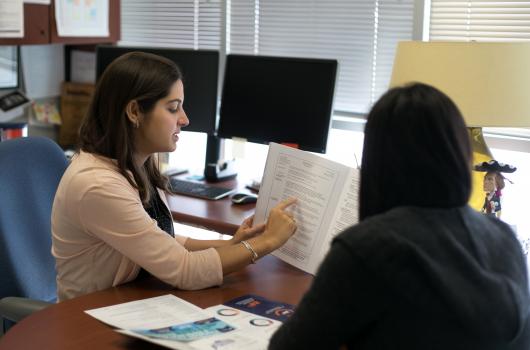
Elevator Pitch
Knowing more about your personal interests, motivations, and abilities will be helpful for you once you begin connecting with others to market your unique strengths. Having this information readily available can also help your informational interviews with your network to feel more productive. This can also be a good tool to develop your response to interview questions like “Tell me about yourself” or “Walk me through your resume.”
Preparing Your Introduction
Make a positive and lasting impression in a short time by preparing your own personal introduction. Introduce yourself by talking about your strongest skills or leadership experiences. Mention your major if you feel it is clearly related to your career goals. Have some questions prepared so that you can engage the other person after your 30-second personal introduction conversation. For example, ask for clarity on what you read in the internship/job description, or talk about a new product or development you noticed on their website or in the news.
Example
I’m a first-year here at UVA, planning on majoring in Psychology. (Personal) I’ve always enjoyed roles where I can serve as a mentor or a teacher, as well as work that focuses on communicating with a diverse group of individuals. (Passion) I think that my work as a tutor with Madison House (Past experience) helped me hone those communication skills as well as mentoring skills. (Portable skills)
I hope that I can further develop those strengths as a [position] with [organization/ company] where I can make a real impact on residents serving as a mentor and someone who can listen to their concerns. (Call to action)
Components
Use a job title, organization, or field of interest when developing your personal pitch. Examples of questions to consider:
- Personal
-
- What is important for people to know about me right away?
- Where am I in my professional or academic career?
- Where would I like to be?
- What are my goals?
- Passion
-
- What are my interests or passions?
- What do I get excited about?
- What motivates me?
- What makes me want to get up in the morning?
- What am I eager to learn more about?
- Past Experience
-
- What experiences have I had in the past that are important to me?
- What have I learned about myself?
- What have I learned about certain professions or academic fields?
- Where have I started to develop expertise?
- Portable Skills
-
- What skills have I gained that I feel are part of my strengths?
- What activities do I engage in on a regular basis?
- What skills have I developed that I feel confident in using?
- Call to Action
-
- What next steps would I like to happen?
- Why am I interested in this company/role/industry?
Practice Your Pitch
Start improving your networking and interviewing skills with VMock’s Elevator Pitch review tool. Gain insights on critical interview elements such as body language, enunciation, and content.
Personal Statement
Your personal statement is an opportunity to set yourself apart from other applicants. It is the portion of the application where you get to discuss who you are and what is important to you, so take advantage of this opportunity! To successfully utilize the personal statement, spotlight two or three particular experiences or examples that demonstrate your motivation and preparation towards making an informed decision about your career path. Unlike the majority of your application, which is largely concerned with what you did, your personal statement should provide depth into why and how you came to your decision that a career in the industry is a good fit for you.
How Does A Personal Statement Fit Into Your Application?
Your personal statement is important, but so are the other components of your application (e.g., recommendations, experience, GPA, cover letters, resume, etc.). The key to a strong application is to be strong in every area of your application. One common mistake students make is to waste time attempting to perfect their personal statement during the application submission phase. Remember to allocate appropriate time to creating a document that demonstrates your interest in the industry professions and career goals; but do not let “personal statement perfecting” delay you in submitting your application.
Questions to Think On
Below are a few questions that admissions committees generally keep in mind when reading a personal statement. Remember, this is not an exhaustive list and opinions will vary from reader to reader.
- Who you are as a person? (e.g., background, experiences, education, etc.)
- Why did you choose ___ instead of another career path?
- Do you possess the qualities necessary to be a health professional?
- How do your professional goals coincide with going to a health professional school?
- Have you explored your interest in the health professions?
- Would I be interested in meeting you?
- Do I want to learn more about you?
- Are you a good fit for the program?
Before Writing: Brainstorm
The brainstorming phase is an important step in the writing process. During this phase, consider every potential topic to include in your statement. Answer the questions below to start the brainstorming process.
- How have you prepared to be a student and why are you ready to enroll now?
- What is special, distinctive, unique or impressive about you or your life story?
- How did you learn about ___? What stimulated your interest in ___?
- What characteristics and skills do you possess that enhance your prospects for success?
- Have you overcome any unusual obstacles or hardships?
- What is your biggest accomplishment? What are you proud of?
- What are the most compelling reasons for the admissions committee to be interested in you?
- What are your short- and long-term goals?
- Did you take time off after earning your undergraduate degree? If so, why and how have you used this time to grow?
- What is the most important thing for an admissions committee to know about you?
- If you took a bridge year, how have you improved your candidacy since graduation?
General Do's and Don't
|
DO's |
|
|
DONT's |
|
Evaluate Your Personal Statement
Evaluation is an important part of the writing process. Carefully read over your personal statement and use the personal statement evaluation chart below to critique your statement. Ask at least one person whose opinion you value to review and evaluate your personal statement as well.
- Content
-
- Did it answer the prompt and/or questions asked?
- Did the opening paragraph capture the reader's attention?
- Is each topic supporting with specific and/or concrete examples?
- Is it personal?
- Does it reflect the writer’s qualifications?
- Is it positive and upbeat? Is it an honest and forthright presentation of the writer?
- Structure
-
- Is it clear and concise?
- Do the first sentences of each paragraph express all the main points?
- Do thoughts and themes flow from paragraph to paragraph?
- Is it well-organized?
- Does it have a main focus?
- Are there an appropriate number of topics addressed? (2 to 3 main topics)
- Does each paragraph have a main point and evidence to support the main point?
- Does it have a solid conclusion that naturally develops from the previous paragraphs?
- Interest
-
- Does it have a compelling theme?
- Does it sound interesting?
- Does the ending give the reader a sense of completeness?
- Mechanics
-
- Is proper punctuation used?
- Is proper capitalization used?
- Do subjects agree with verbs?
- Does it contain typos?
- Are contractions used sparingly?
- Does it use “I” appropriately?
- Is active voice used?
- Overall
-
- Would I be interested in meeting the person who wrote this personal statement?
- Do I want to learn more about the person that wrote this personal statement?
- Would the writer be a good addition to the student body?

